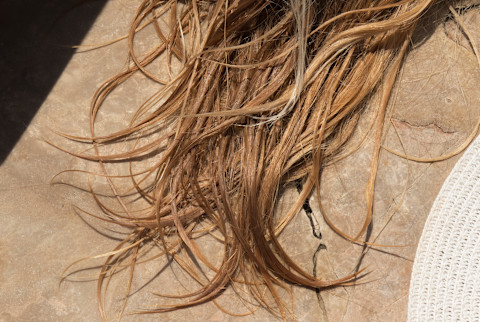
If you frequent pool days or spend hours in the ocean, you're likely familiar with the dry, crunchy texture your hair takes on post-swim. You may find your hair is more difficult to detangle or feels extra dry after taking a dip. If this sounds like you, here's a hard truth: That pool or ocean water isn't doing anything good for your strands.
Nevertheless, there are a few tips you can follow to make sure your hair stays healthy all summer long. We chatted with celebrity stylist, hair expert, and co-founder of dpHue Justin Anderson to nail down the essential steps for post-swim hair care:
Prep your hair for the water.
While aftercare is essential, you may be able to prevent some of the dryness by prepping your hair correctly. Anderson recommends finding a hair oil you love and lathering that on your strands before diving in. If you don't have a hair oil on hand, you can rinse your hair with fresh water instead.
The goal here is to make sure your hair is already hydrated before exposing it to harmful chemicals or salt. "Your hair will absorb the oil or freshwater first, minimizing the amount of chlorine or saltwater your hair absorbs," Anderson explains.
Rinse your hair ASAP post-swim.
Because chlorine and saltwater have the power to strip your strands of hydration, it's best to rinse out that water as soon as you can. The longer it sits in the hair, the more harm it will do. Plus, it'll be easier to brush out later on, if you choose to detangle. Beyond drying out your strands, salt and chlorine can also steal your hair's shine, resulting in a dull, lifeless look.
When you do wash your hair, you'll want to be mindful of the products you''re reaching for. If you have blond hair, you can benefit from using a purple shampoo post-swim (our favorites here). "Chlorine can definitely tint your color, especially for blondes and those with highlighted hair," Anderson says. "So I recommend using a purple shampoo to pull out any unwanted brassy tones that may have been a result of the chlorine."
If you have curly hair, you'll want to double down on hydration. Curls tend to be more prone to dryness, so you can benefit from the extra hydration a hair mask can bring. Anderson's go-to pick: the Apple Cider Vinegar Masque from dpHue. Lather this mask onto your mid-lengths to ends and leave it on for at least five minutes. Then rinse off and follow up with the rest of your hair care routine.
Hydrate, hydrate, hydrate.
So you've rinsed the chlorine or saltwater out of your hair, cleansed, and conditioned. Now, you'll want to follow up with hydrating leave-in products. Run a leave-in conditioner through your strands after stepping out of the shower (here's a list of our top picks). Then reach for a hydrating hair oil like the Legendary Amazon Oil from Rahua. If you want to give your scalp some extra TLC, you can add a scalp serum as well.
You'll also want to tread lightly on your hair, as your scalp may be irritated from the chlorine and saltwater. If you detangle post-shower, be sure to go slow and keep it gentle to avoid additional breakage or irritation.
The takeaway.
Diving into a body of water on an extra-hot day feels delightful, but you may be exposing your hair to more harm than you think. This doesn't mean you should avoid swimming altogether; it's just a reminder to take the time to care for your strands both pre- and post-swim.
Lather your hair in oil or rinse in freshwater before diving in, rinse out the chlorine or saltwater ASAP, and follow up with hydrating hair products after you rinse. This way, your hair will survive those long summer days without additional breakage. Caring for your skin post-swim is a whole other ballgame—but you can read all about that here.
